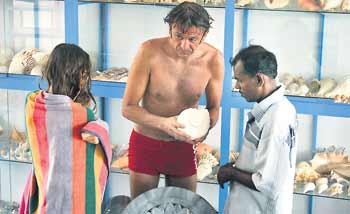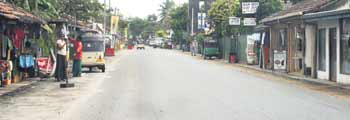
| Tourism in a turbulent Sri Lanka Hikkaduwa, a southern tourist haven with its sandy beaches, scuba diving, glass bottom boat rides, rustic restaurants and hotels and souvenir shops should be teeming with tourists and locals, particularly at this time of the year. The winter season, stretching from December up until April is usually the best time for tourism in the island.
Contrary to this picturesque scene of a prime tourist destination today Hikkaduwa beaches and the roads are virtually deserted of foreigners. Except for a hand full of tourists of whom a majority were repeaters who are familiar with the country and the current situation, the rest who come in stay in hotel compounds and do not venture out to frequent the shops and the local restaurants which depend solely on the tourists for business. From the small street vendors, handicrafts boutiques to local eateries, are all facing dire hardships due to the lack of tourists who bring in the best of business for them. Colombo the hub of many five star hotels resembles more of a military zone than a normal bustling city anywhere else in the world. This may also put off any normal tourist from travelling around the rest of the country due to security concerns. The added barriers along the main roads and road blocks and security checks would put off any traveller. Statistics released by the Tourist Board depict a steady decline from June 2006 to date as opposed to the corresponding period last year. The overall totals however depict an increase in the number of visitors to the country by 1.9% from 2005 to 2006. However this may be attributed to the fact that many aid workers came into the country during the period on relief and reconstruction missions in the aftermath of the Tsunami. S. Kalaiselvam, Director General of the Sri Lanka Tourist Board (SLTB) confirmed to The Sunday Times FT that the country is experiencing a drop in tourism. “We didn’t perform well this winter because of security concerns,” he said. “We are participating in some of the consumer affairs events. In February, the President (Mahinda Rajapaksa) will be making a state visit to China so we will also be going for promotions. In March, we will be participating in a (main industry) fair in Germany.” According to the Director General, Sri Lanka had 550,000 tourists last year. “We are working on a target of 600,000 for 2007. There has been low occupancy in hotels. Luckily, we have domestic tourism.” Kalaiselvam said there has been a definite increase in domestic tourism. The Tourist Board and hotels also seem to be tapping into the Indian market, given its close proximity and staggering population as a potential tourist pool. “The Indian market is viable because we are neighbouring countries and have 100 flights per week. We are having some consumer promotions this January and February,” Kalaiselvam continued. More than 100,000 tourists from India visit the island every year.
“As far as India is concerned, they know the geography of Sri Lanka and they know that the North and East are far away from Colombo.” He added that tourists are well aware of what is happening in the country because of foreign media and that tour operators abroad are also being kept informed of the current situation. When asked if embassies in Sri Lanka such as the United States were advising their citizens travelling in the country to avoid crowded areas and government departments, Kalaiselvam said it is true but understandable that embassies would issue these types of warnings. Meanwhile large companies such as John Keells Hotels and Aitken Spence Hotels have been investing in the Maldives in recent years as an investment option in a country that seems a more desirable option for tourists who want sun and sand. Ajith Gunawardena, Managing Director of John Keells Hotels said, “Our (Sri Lankan) resorts are not doing very well. The occupancy is half its usual rate.” He continued that there has been a significant drop in their hotel occupancy levels although there has been a slight pick up in the last few weeks’ right after the holiday season. The usual occupancy rate at present is 50 – 60%. However, the occupancy rate at this time period, which is considered the high season should be around 90%. “Obviously, the destinations with escalation of violence and instability become a cause for concern for the tourists when they make their choices. Only those who know the real situation in the country will be comfortable with coming here.” John Keells is planning to market tourism in the country on the lines that the violence is not targeting tourists. “It is not easy but it has to be done.” John Keells expects their occupancy to hit mid levels by the summer. However, subject to general stability in the country, by next winter the occupancy should pick up, Gunawardena said. Managing Director of Aitken Spence Hotels, Malin Hapugoda told The Sunday Times FT that generally in December, all of their hotels see around 80 – 90% occupancy rates. However this year, it was around 55 – 60% with their beach hotels reaching about 45%. Hapugoda said in previous years, the guests would be around 70% foreign tourists and 30% locals but this year, the numbers have been reversed. “Most hotels will end up this season minus and hopefully if things improve, we should be able to do something about this.” Aitken Spence Hotels have already cut down their costs and reduced their rates and have been engaged in giving promotional packages, particularly through agents who are still operating in Britain. “We also have a lot of attractive packages for Sri Lankans for long weekends. We are trying to survive.” Low occupancy in
Hikkaduwa hotels If anyone were to stroll down the streets of Hikkaduwa, it is noticeably empty. The shops and restaurants are not seeing many clients. The beaches are sparsely dotted with tourists and locals. A.P. Anura De Vaas Gunawardena who runs a shop called Masks Centre, selling traditional Sri Lankan masks in Hikkaduwa, told The Sunday Times FT that business is at an all time low. He usually managed to pull in about Rs.50,000 per month when tourism was good but not so anymore. Similarly, the manager of a jewellery store said sales were down by 85% and attributes it to the situation in the country. The overseas travel agents have been issuing warnings that Sri Lanka is a danger zone and the SLTB is not doing their job, the manager said. He added that the SLTB website is not properly advertising the country by giving tourists the correct information. They are afraid to get on buses or trains,” he said. Since he does not see business as improving anytime soon, he is thinking of going to Germany in April to seek some more profitable opportunities. He has had to downgrade the number of employees at the Diving Centre from seven to five because he is unable to pay their wages. Similarly, the likes of Gunawardena from the Masks Centre have also suspended work of workers under them due to the decrease in demand for the pieces. Not only is the lack of business affecting these store owners directly but also the suppliers and people who work for them. An Italian national, who rents a house in Hikkaduwa from October to April of every year told this newspaper that tourists usually believe that the conflict and violence in the country is relegated to the North and East but with the incidents in Galle and Hikkaduwa, they feel the problem is hitting closer to where they thought were safe areas. “European governments have also issued travel advisories for the country,” he said. When asked why he comes back year after year, he said the situation is different for him because he does not consider himself to be a tourist. His daughter lives in Sri Lanka so he is also here to spend time with her and his grandchild in addition to enjoying the ‘stunning weather, sunny skies and beautiful beaches.’ Another group of foreign tourists who were in Hikkaduwa when the bus bomb exploded last Saturday said they felt very ‘shaken up’ by the events but will continue to travel to other areas in keeping with their tour of the country. However, not many have been bold enough to stick to their holiday plans as evidenced by many of the shopkeepers and vendors who said a lot of tourists left the area immediately after the bombing. Even though the large hotels have been experiencing average occupancy rates, the smaller hotels which line the coastal belt have been severely hit. Many expressed despair over rather low occupancy rates which fell well below half. In one case, a small hotelier with 25 rooms had only managed to rent out four whereas under normal conditions, the hotel would be running at full capacity. If the decline in the stability of the country continues, the tourist industry will face more hardships in the months to come. However, the country has to be promoted as a destination which is safe for tourists despite the travel advisories and warnings which have been issued abroad. Foreigners who come here year after year to enjoy the wealth of beauty, culture, history and splendour of the country will never stop coming because they are aware of the political situation in the country and they are familiar with which areas of the country have been most adversely affected. Now potential first time visitors have to also be informed. |
| || Front
Page | News
| Editorial
| Columns
| Sports
| Plus
| Financial
Times | International
| Mirror
| TV
Times | Funday
Times | ST-1 || |
| |
Copyright
2007 Wijeya
Newspapers Ltd.Colombo. Sri Lanka. |

